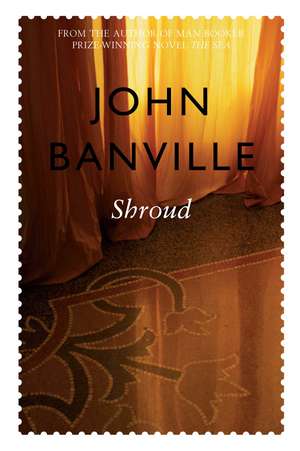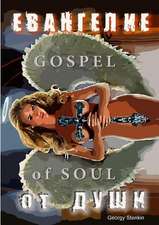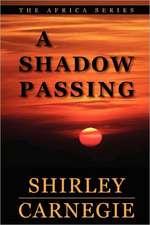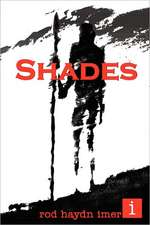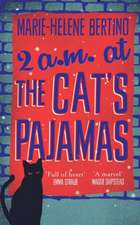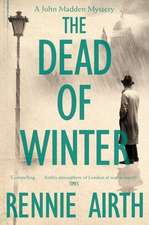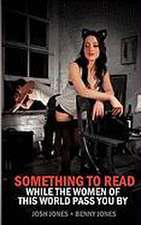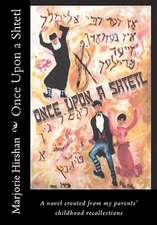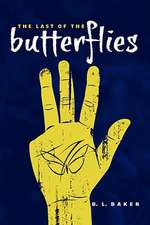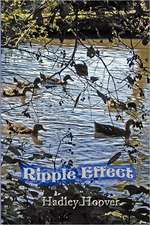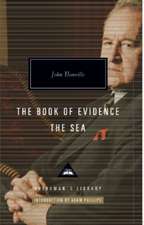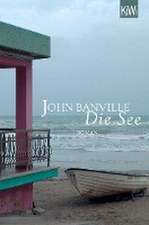Shroud: Cleave Trilogy
Autor John Banvilleen Limba Engleză Paperback – 5 mar 2010
Dark secrets and reality unravel in Shroud, the second of John Banville's three novels to feature Cass Cleave, alongside Eclipse and Ancient Light.
Axel Vander, distinguished intellectual and elderly academic, is not the man he seems.
When a letter arrives out of the blue, threatening to unveil his secrets - and carefully concealed identity - Vander travels to Turin to meet its author. There, muddled by age and alcohol, unable always to distinguish fact from fiction, Vander comes face to face with the woman who has the knowledge to unmask him, Cass Cleave. However, her sense of reality is as unreliable as his, and the two are quickly drawn together, their relationship dark, disturbed and doomed to disaster from its very start.
| Toate formatele și edițiile | Preț | Express |
|---|---|---|
| Paperback (2) | 44.40 lei 22-36 zile | +30.63 lei 5-11 zile |
| Pan Macmillan – 5 mar 2010 | 44.40 lei 22-36 zile | +30.63 lei 5-11 zile |
| Vintage Publishing – 31 mai 2004 | 101.39 lei 22-36 zile |
Preț: 44.40 lei
Preț vechi: 64.04 lei
-31% Nou
Puncte Express: 67
Preț estimativ în valută:
8.50€ • 8.85$ • 7.18£
8.50€ • 8.85$ • 7.18£
Carte disponibilă
Livrare economică 17 februarie-03 martie
Livrare express 31 ianuarie-06 februarie pentru 40.62 lei
Preluare comenzi: 021 569.72.76
Specificații
ISBN-13: 9780330483148
ISBN-10: 0330483145
Pagini: 416
Dimensiuni: 129 x 198 x 27 mm
Greutate: 0.27 kg
Editura: Pan Macmillan
Seria Cleave Trilogy
Locul publicării:United Kingdom
ISBN-10: 0330483145
Pagini: 416
Dimensiuni: 129 x 198 x 27 mm
Greutate: 0.27 kg
Editura: Pan Macmillan
Seria Cleave Trilogy
Locul publicării:United Kingdom
Notă biografică
John Banville was born in Wexford, Ireland, in 1945. His first book, Long Lankin, was published in 1970. His other books include Nightspawn , Birchwood, Doctor Copernicus (which won the James Tait Black Memorial Prize in 1976), Kepler (which was awarded the Guardian Fiction Prize in 1981), The Newton Letter, Mefisto, The Book of Evidence, Ghosts, Athena, The Untouchable, Eclipse and The Sea. He has received a literary award from the Lannan Foundation. He lives in Dublin.
Descriere
A chillingly beautiful novel by the author of the Man Booker Prize-winning The Sea.
Extras
Who speaks? It is her voice, in my head. I fear it will not stop until I stop. It talks to me as I haul myself along these cobbled streets, telling me things I do not want to hear. Sometimes I answer, protest aloud, demanding to be left in peace. Yesterday in the baker’s shop that I frequent on the Via San Tommaso I must have shouted out something, her name, perhaps, for suddenly everyone in the crowded place was looking at me, as they do here, not in alarm or disapproval but simple curiosity. They all know me by now, the baker and the butcher and the fellow at the vegetable stall, and their customers, too, hennaed housewives, mostly, plump as pigeons, with their perfume and ugly jewellery and great, dark, disappointed eyes. I note their remarkably slender legs; they age from the top down, for these are still the legs, suggestively a little bowed, that they must have had in their twenties or even earlier. Clearly I interest them. Perhaps what appeals to them is the suggestion of the commedia dell’arte in my appearance, the one-eyed glare and comically spavined gait, the stick and hat in place of Harlequin’s club and mask. They do not seem to mind if I am mad. But I am not mad, really, only very, very old. I feel I have been alive for aeons. When I look back I see what seems a primordial darkness, scattered with points of cold, hard light, immensely distant, each from each, and from me. Soon, in a few months, we shall enter the final decade of this millennium; I will not live to see the next one, a matter of some regret, the previous two having generated such glories, such delights.
Yes, I have returned to this arcaded city, unwisely, it may be. I rented a place in one of the little alleyways hard by the Duomo, I shall not say which one, for reasons that are not entirely clear to me, although I confess I worry intermittently about the possibility of a visit from the police. It is not much, my bolt-hole, a couple of rooms, low-ceilinged, dank; the windows are so narrow and dirty I have to keep a table lamp burning all day for fear of falling over something in the half dark. I would not wish to be found dead here, the door broken down, my landlady screaming, and I in who knows what mode of disarray. She is, my landlady—quella strega!—a widow, and of a decidedly histrionic bent. She tells me this used to be the city’s red light district, and gives me a look the import of which I do not care to speculate upon, widening her eyes and holding her head far back, affording me an unpleasant view into the caverns of her nostrils. I always suspected I would end up like this, an outcast, stumping the back streets of some anonymous city, talking to myself and being stared at by passers-by. Yet I chose to come back here, though not out of fondness, certainly. Turin resembles nothing so much as a vast, grandiose cemetery, with all this marble, these monuments, these gesturing statues; it is no wonder poor N. went off his head here, thinking himself a king and the father of kings and stopping in the street to embrace a cabman’s nag. They lost his luggage, too, as once they did mine, sent it to Sampierdarena when he was headed in the opposite direction; forever after he could not hear that melodious place-name without a snarl of rage.
Enough of these vagaries. I am going to explain myself, to myself, and to you, my dear, for if you can talk to me then surely you can hear me, too. Calmly, quietly, eschewing my accustomed gaudiness of tone and gesture, I shall speak only of what I know, of what I can vouch for. At once the polyp doubt rears its blunt and ugly head: what do I know? for what can I vouch? There exists neither “spirit,” nor reason, nor thinking, nor consciousness, nor soul, nor will, nor truth: all are fictions . . . So the crazed philosopher declares, swinging his mighty hammer. Yet the notion haunts me that I am being given one last chance to redeem something of myself. I am not speaking of the soul, I am not that far gone in my dotage. But there may be some small, precious thing that I can buy back, as once I bought back Mama Vander’s silver pill-box from the pawnbroker’s. It occurs to me to wonder if that might have been your real purpose, not to expose me and make a name for yourself at all, but rather to offer me the possibility of redemption. If so, you have already had an effect: redemption is not a word that up to now has figured prominently in my vocabulary. But then your motives were never clear to me, no more, I suspect, than they were to you. Perhaps you did indeed betray me, and someday soon a publication will pop up from the presses in an obscure corner of academe with a posthumous essay in it, by you, on me, and I shall be disgraced, laughed at, hooted out of the lecture hall. Well, no matter.
The name, my name, is Axel Vander, on that much I insist. That much, if no more. Her letter was delivered to me one morning a world ago in the pleasant town of Arcady by a helmed and goggled Hermes on a bike. The message it carried was one I had been waiting for and dreading all my life, what I think of as my life, my real life. Now it had come at last, and the first thing I felt was embarrassment. It was as if I had been informed that a long-dead sibling, hardly remembered and never loved, was not dead after all, but tritely and vigorously alive, residing in a neighbouring suburb and about to pay an impossible visit. What could I find to say, at such a distance of time, to this discarded version of myself? I drank whisky all day, euphoric with terror and panic, and woke up at dead of night to find myself slumped in the old swivel chair down in my study with a burnt-out cigarette stub still in my fingers. From outside in the soft California darkness I could smell the smells that were exotic to me even yet, after so many years: eucalyptus, dust still warm from the day’s sun, the tang of charcoal drifting down from the blond hills where fires had been smouldering sullenly in the grass for months. I let the letter fall to the floor and laughed the inane laugh of the inebriated. A car sizzled past on Cedar Street, going very slowly, as if its driver were counting the house numbers, and I thought of a mask with narrowed eyes behind it scanning the doors and the blinded windows. I lifted a hand and cocked my thumb and pointed a finger into the darkness where the door was. I laughed again, more phlegmily this time, and turned my hand around and stuck the pointing finger into my mouth and let the thumb fall like a hammer. I would have put a bullet in myself if . . . if what?
Pah.
I tried to rise but could not, and fell back with a clatter, the chair squealing in agony under me, my dead leg rolling like a log. I hate this leg, ineluctable companion of my failing years, hate it even more than the sightless eye that glares at me unmoving from the morning mirror, clouded and colourless as I imagine the eye of a dead albatross. That is what I am, a dead weight hung about my own neck. It will not be so for long more. Lately I have begun to feel that I am falling off myself, that my suety old flesh is melting off my skeleton and soon will all be gone. I shall not mind; I shall be glad; I shall rise up then, bared of inessentials, all gleaming bone and sinew smooth as candle wax, new, unknown, my real self at last. There is a moment that comes in drunkenness, or on the far side of it, when, as is said to happen sometimes to the afflicted in the throes of a heart attack, I seem to separate from my body and float upward, and hang aloft, looking down on the spectacle of myself with disinterested attention. It had happened now. I saw myself sprawled there, and then shift again with a violent heave, like a splayed horse trying to get to its feet, flailing about helplessly, muttering. I reached for the bottle on the desk and drank greedily from the neck, making suckling noises. My mouth was raw from the long day’s drinking. When I let my arm sweep down beside the chair the bottle slipped from my fingers and rolled with a joggling hesitancy on the polished wooden floor, pouring its heart out in lavish, glottal gulps. Let it spill. In truth, I dislike the smoke-and-ashes taste of bourbon, but early on I had fixed on it to be my drink, as part of my strategy of difference, another way of being on guard, as an actor puts a pebble in his shoe to remind him that the character he is playing has a limp. This was in the days when I was making myself over. So difficult it was, to judge just so, to forge the fine discriminations, to maintain a balance—no one could know how difficult. If it had been a work of art I was fashioning they would have applauded my mastery. Perhaps that was my mistake, to do it all in secret, instead of openly, with a flourish. They would have been entertained; they would have forgiven me; Harlequin is always forgiven, always survives.
I heard paper crackle under one of the castors of the chair, like a snicker of admonitory laughter. It was that letter. See: I lean, I grunt, I pluck it up and flatten it with a fist on the arm of the chair and read it yet again in the cone of gold-dusted light that bathes me in its undeserved benevolence, my old wild leaning head, my sloping shoulder, my rope-veined claw. The typewritten lines flicker in time to a pulse beating in my temple, and my good eye waters with the effort of keeping the words steady and in line. She was in Antwerp—Antwerp, dear God! Her studied, scholarly tone amused me. Narrowly, striving to concentrate, I speculated as to how much she might know. I had thought I had shaken off the pelt of my far past yet here was evidence that it would not be entirely sloughed, but was dragging along behind me, still attached by a thread or two of dried slime.
It came to me then, with drunken clarity, what I would do. Odd, how this random world insinuates its sly suggestions. I scrabbled among the papers on the desk and found the embossed card that had been lying there for a week and read with a rictus of contempt its curlicued and pompous blandishments. Chiarissimo Professore! Il Direttore del Convegno considera un altissimo onore e un immenso piacere invitarla ufficialmente a Torino . . . I had intended to decline, of course, with a curt and scornful note, but now I saw that I must go, and make her come to me there. Where better to confront my ruin, if that was what it was to be?
When I had read the letter first my first thought had been to disappear, simply to stand up and walk out of my life, as I did once before, with remarkable, with outrageous, success. It would be less easy this time; then, I was no one, now there are people—a select band, but a band—across however many continents there are who know the name of Axel Vander; all the same, it could be done. I had my escape routes mapped out, my secret bank accounts primed, my sanctuaries sealed and waiting . . . I am exaggerating, of course. But for a minute or two I did entertain the thought of fleeing, and was entertained by it. It made me feel daring, dangerous; it made me feel young. I wondered if this wielder of the poison pen, whoever she might be, had known the effect her letter would have on me: was it possible she was allowing me time to cut and run? But where would I go to, really? Whatever plans I might have put in place, there was nowhere farther I could escape to beyond this tawny shore, last edge of what for me was the known world. No, I would not do it, I would not give her the satisfaction of hearing the clump and stumble of my clay feet as I fled. Better far to confront her, laugh in the face of her accusations—ha! I would lie to her, of course; mendacity is second, no, is first nature to me. All my life I have lied. I lied to escape, I lied to be loved, I lied for placement and power; I lied to lie. It was a way of living; lies are life’s almost-anagram. And now my earliest exercises in the art, my prentice falsehoods, had come back to undo me.
Yes, I have returned to this arcaded city, unwisely, it may be. I rented a place in one of the little alleyways hard by the Duomo, I shall not say which one, for reasons that are not entirely clear to me, although I confess I worry intermittently about the possibility of a visit from the police. It is not much, my bolt-hole, a couple of rooms, low-ceilinged, dank; the windows are so narrow and dirty I have to keep a table lamp burning all day for fear of falling over something in the half dark. I would not wish to be found dead here, the door broken down, my landlady screaming, and I in who knows what mode of disarray. She is, my landlady—quella strega!—a widow, and of a decidedly histrionic bent. She tells me this used to be the city’s red light district, and gives me a look the import of which I do not care to speculate upon, widening her eyes and holding her head far back, affording me an unpleasant view into the caverns of her nostrils. I always suspected I would end up like this, an outcast, stumping the back streets of some anonymous city, talking to myself and being stared at by passers-by. Yet I chose to come back here, though not out of fondness, certainly. Turin resembles nothing so much as a vast, grandiose cemetery, with all this marble, these monuments, these gesturing statues; it is no wonder poor N. went off his head here, thinking himself a king and the father of kings and stopping in the street to embrace a cabman’s nag. They lost his luggage, too, as once they did mine, sent it to Sampierdarena when he was headed in the opposite direction; forever after he could not hear that melodious place-name without a snarl of rage.
Enough of these vagaries. I am going to explain myself, to myself, and to you, my dear, for if you can talk to me then surely you can hear me, too. Calmly, quietly, eschewing my accustomed gaudiness of tone and gesture, I shall speak only of what I know, of what I can vouch for. At once the polyp doubt rears its blunt and ugly head: what do I know? for what can I vouch? There exists neither “spirit,” nor reason, nor thinking, nor consciousness, nor soul, nor will, nor truth: all are fictions . . . So the crazed philosopher declares, swinging his mighty hammer. Yet the notion haunts me that I am being given one last chance to redeem something of myself. I am not speaking of the soul, I am not that far gone in my dotage. But there may be some small, precious thing that I can buy back, as once I bought back Mama Vander’s silver pill-box from the pawnbroker’s. It occurs to me to wonder if that might have been your real purpose, not to expose me and make a name for yourself at all, but rather to offer me the possibility of redemption. If so, you have already had an effect: redemption is not a word that up to now has figured prominently in my vocabulary. But then your motives were never clear to me, no more, I suspect, than they were to you. Perhaps you did indeed betray me, and someday soon a publication will pop up from the presses in an obscure corner of academe with a posthumous essay in it, by you, on me, and I shall be disgraced, laughed at, hooted out of the lecture hall. Well, no matter.
The name, my name, is Axel Vander, on that much I insist. That much, if no more. Her letter was delivered to me one morning a world ago in the pleasant town of Arcady by a helmed and goggled Hermes on a bike. The message it carried was one I had been waiting for and dreading all my life, what I think of as my life, my real life. Now it had come at last, and the first thing I felt was embarrassment. It was as if I had been informed that a long-dead sibling, hardly remembered and never loved, was not dead after all, but tritely and vigorously alive, residing in a neighbouring suburb and about to pay an impossible visit. What could I find to say, at such a distance of time, to this discarded version of myself? I drank whisky all day, euphoric with terror and panic, and woke up at dead of night to find myself slumped in the old swivel chair down in my study with a burnt-out cigarette stub still in my fingers. From outside in the soft California darkness I could smell the smells that were exotic to me even yet, after so many years: eucalyptus, dust still warm from the day’s sun, the tang of charcoal drifting down from the blond hills where fires had been smouldering sullenly in the grass for months. I let the letter fall to the floor and laughed the inane laugh of the inebriated. A car sizzled past on Cedar Street, going very slowly, as if its driver were counting the house numbers, and I thought of a mask with narrowed eyes behind it scanning the doors and the blinded windows. I lifted a hand and cocked my thumb and pointed a finger into the darkness where the door was. I laughed again, more phlegmily this time, and turned my hand around and stuck the pointing finger into my mouth and let the thumb fall like a hammer. I would have put a bullet in myself if . . . if what?
Pah.
I tried to rise but could not, and fell back with a clatter, the chair squealing in agony under me, my dead leg rolling like a log. I hate this leg, ineluctable companion of my failing years, hate it even more than the sightless eye that glares at me unmoving from the morning mirror, clouded and colourless as I imagine the eye of a dead albatross. That is what I am, a dead weight hung about my own neck. It will not be so for long more. Lately I have begun to feel that I am falling off myself, that my suety old flesh is melting off my skeleton and soon will all be gone. I shall not mind; I shall be glad; I shall rise up then, bared of inessentials, all gleaming bone and sinew smooth as candle wax, new, unknown, my real self at last. There is a moment that comes in drunkenness, or on the far side of it, when, as is said to happen sometimes to the afflicted in the throes of a heart attack, I seem to separate from my body and float upward, and hang aloft, looking down on the spectacle of myself with disinterested attention. It had happened now. I saw myself sprawled there, and then shift again with a violent heave, like a splayed horse trying to get to its feet, flailing about helplessly, muttering. I reached for the bottle on the desk and drank greedily from the neck, making suckling noises. My mouth was raw from the long day’s drinking. When I let my arm sweep down beside the chair the bottle slipped from my fingers and rolled with a joggling hesitancy on the polished wooden floor, pouring its heart out in lavish, glottal gulps. Let it spill. In truth, I dislike the smoke-and-ashes taste of bourbon, but early on I had fixed on it to be my drink, as part of my strategy of difference, another way of being on guard, as an actor puts a pebble in his shoe to remind him that the character he is playing has a limp. This was in the days when I was making myself over. So difficult it was, to judge just so, to forge the fine discriminations, to maintain a balance—no one could know how difficult. If it had been a work of art I was fashioning they would have applauded my mastery. Perhaps that was my mistake, to do it all in secret, instead of openly, with a flourish. They would have been entertained; they would have forgiven me; Harlequin is always forgiven, always survives.
I heard paper crackle under one of the castors of the chair, like a snicker of admonitory laughter. It was that letter. See: I lean, I grunt, I pluck it up and flatten it with a fist on the arm of the chair and read it yet again in the cone of gold-dusted light that bathes me in its undeserved benevolence, my old wild leaning head, my sloping shoulder, my rope-veined claw. The typewritten lines flicker in time to a pulse beating in my temple, and my good eye waters with the effort of keeping the words steady and in line. She was in Antwerp—Antwerp, dear God! Her studied, scholarly tone amused me. Narrowly, striving to concentrate, I speculated as to how much she might know. I had thought I had shaken off the pelt of my far past yet here was evidence that it would not be entirely sloughed, but was dragging along behind me, still attached by a thread or two of dried slime.
It came to me then, with drunken clarity, what I would do. Odd, how this random world insinuates its sly suggestions. I scrabbled among the papers on the desk and found the embossed card that had been lying there for a week and read with a rictus of contempt its curlicued and pompous blandishments. Chiarissimo Professore! Il Direttore del Convegno considera un altissimo onore e un immenso piacere invitarla ufficialmente a Torino . . . I had intended to decline, of course, with a curt and scornful note, but now I saw that I must go, and make her come to me there. Where better to confront my ruin, if that was what it was to be?
When I had read the letter first my first thought had been to disappear, simply to stand up and walk out of my life, as I did once before, with remarkable, with outrageous, success. It would be less easy this time; then, I was no one, now there are people—a select band, but a band—across however many continents there are who know the name of Axel Vander; all the same, it could be done. I had my escape routes mapped out, my secret bank accounts primed, my sanctuaries sealed and waiting . . . I am exaggerating, of course. But for a minute or two I did entertain the thought of fleeing, and was entertained by it. It made me feel daring, dangerous; it made me feel young. I wondered if this wielder of the poison pen, whoever she might be, had known the effect her letter would have on me: was it possible she was allowing me time to cut and run? But where would I go to, really? Whatever plans I might have put in place, there was nowhere farther I could escape to beyond this tawny shore, last edge of what for me was the known world. No, I would not do it, I would not give her the satisfaction of hearing the clump and stumble of my clay feet as I fled. Better far to confront her, laugh in the face of her accusations—ha! I would lie to her, of course; mendacity is second, no, is first nature to me. All my life I have lied. I lied to escape, I lied to be loved, I lied for placement and power; I lied to lie. It was a way of living; lies are life’s almost-anagram. And now my earliest exercises in the art, my prentice falsehoods, had come back to undo me.
Recenzii
“Hypnotic. . . . As much as any author today, [Banville] demonstrates the continuing relevance of words like ‘artistry’ and ‘masterpiece.’”
– The New York Times Book Review
“The style—the voice—is a phenomenon, a wonder in itself. . . . Shroud is full of . . . secrets that change everything once you notice them. . . . Dazzling.” –Los Angeles Times Book Review
“Glittering, far-reaching intelligence. . . . Sentences, paragraphs, pages that by their exact and passionate beauty transport the reader and make the world new.” –The Boston Globe
“A seductive narrator. . .a writer of fastidious skill who captures the most delicate registers of feeling and mood with an often sublime precision.” – Newsday
“A virtuoso tale of grief, loss and salvation. His dazzling lyricism and extraordinary language resonate long after the story ends. . . . This dreamlike novel . . . glows with the subdued brilliance of its author’s searching intellect. The long stretches of breathtaking prose, addictive and illuminating, are what make this Shroud just shy of miraculous.” —The Oregonian
“A ravishingly beautiful writer. His prose is clean and unfussy. . .and his images and metaphors have a visionary keenness that’s almost violent; they strike the readers like blows.”–Salon
“Shroud shocks its reader. . . . It throbs along powerfully . . . until out of nowhere a beautiful sentence stops things cold. Banville’s prose is thick and sumptuous.”–Entertainment Weekly
“Can only be called a page-turner. . .what propels the reader’s fascination and admiration is the brilliance of its art.”–St. Louis Post-Dispatch
“Banville. . . [has] an allusive, alliterative prose style; a sly sense of humor; a meditative intelligence drawn to art and artifice; an appraiser’s eye that seeks out the odd corners of beauty in this world but reserves a disdainful glance for its conventions. . . . An unlikely and affecting story of redemption.”–Houston Chronicle
“A work of fiction with . . imaginative ambition and integrity.”–The Washington Post Book World
“John Banville is a master of narrative, language and imagery. His fictional characters . . . have daunting intellectual and individual breadth. . . . The author’s gift is the taut examination of characters as they hold their own disquieted review of themselves. His prose is eloquent and his language reverberates with clarity.” —Rocky Mountain News
“As much potboiler mystery as it is intellectual tour de force. . . . As a meditation on the nature of personal identity, indeed on the meaning of truth, Shroud is a masterpiece.”–Fort Worth Morning Star-Telegram
“Every sentence of Shroud is thrilling with Nabokovian wit, sorrow and beauty.”–The Commercial Appeal (Memphis)
“Difficult to resist. . .Banville has always been a sumptuous writer, but his love for the Jamesian sentence seems especially well-suited here.”–The Milwaukee Journal Sentinel
“Almost every one of his gorgeous sentences has the brooding, propulsive power of the heavens above his narrator’s lost Belgian home. . . . Banville weaves a haunting, lingering tale of a soul forever severed from its own identity.”–Seattle Weekly
“Hallucinatory. . .His skill at not losing us along the way is simply extraordinary. So is his prose, which, like Shroud, is hypnotic.”–Delaware News-Journal
“Narratively performs the very theory it allegorizes. The story engages quite suspensefully. His diction and command of language . . . are nothing short of genius.”–The Mobile Register
“Part mystery, part epistemological jigsaw puzzle, part black-comedy. . . We’re treated, on nearly every page, to the pleasure of a formidable writer’s fresh take on age-old themes: the nature of self and the limits of love.”–LA Weekly
“I am grateful for what I discovered [in Shroud], grateful for watching a deeply moral writer at the top of his game, grateful for having known a literary character far more intimately that most ‘real people’ I have met. It will. . .amaze you.”–David Prather, Huntsville Times
“In this mesmerising novel, taut with intelligence, compassion and wit, Banville has once again worked his extravagant alchemy, transmuting this prose of the familiar world into the poetry of revelation and renewal.” —Independent on Sunday
“In beautiful, lucid prose, John Banville describes a tragedy so strongly rooted in history and character that, like all real tragedies, it could not happen otherwise.” —The Times (London)
“Morally gripping as it is, Shroud is still a Banville performance, playing brilliantly with language in the gap between actuality and perception . . . Shroud will not easily be surpassed for combination of wit, moral complexity and compassion. It is hard to see what more a novel could do.” —The Irish Times
– The New York Times Book Review
“The style—the voice—is a phenomenon, a wonder in itself. . . . Shroud is full of . . . secrets that change everything once you notice them. . . . Dazzling.” –Los Angeles Times Book Review
“Glittering, far-reaching intelligence. . . . Sentences, paragraphs, pages that by their exact and passionate beauty transport the reader and make the world new.” –The Boston Globe
“A seductive narrator. . .a writer of fastidious skill who captures the most delicate registers of feeling and mood with an often sublime precision.” – Newsday
“A virtuoso tale of grief, loss and salvation. His dazzling lyricism and extraordinary language resonate long after the story ends. . . . This dreamlike novel . . . glows with the subdued brilliance of its author’s searching intellect. The long stretches of breathtaking prose, addictive and illuminating, are what make this Shroud just shy of miraculous.” —The Oregonian
“A ravishingly beautiful writer. His prose is clean and unfussy. . .and his images and metaphors have a visionary keenness that’s almost violent; they strike the readers like blows.”–Salon
“Shroud shocks its reader. . . . It throbs along powerfully . . . until out of nowhere a beautiful sentence stops things cold. Banville’s prose is thick and sumptuous.”–Entertainment Weekly
“Can only be called a page-turner. . .what propels the reader’s fascination and admiration is the brilliance of its art.”–St. Louis Post-Dispatch
“Banville. . . [has] an allusive, alliterative prose style; a sly sense of humor; a meditative intelligence drawn to art and artifice; an appraiser’s eye that seeks out the odd corners of beauty in this world but reserves a disdainful glance for its conventions. . . . An unlikely and affecting story of redemption.”–Houston Chronicle
“A work of fiction with . . imaginative ambition and integrity.”–The Washington Post Book World
“John Banville is a master of narrative, language and imagery. His fictional characters . . . have daunting intellectual and individual breadth. . . . The author’s gift is the taut examination of characters as they hold their own disquieted review of themselves. His prose is eloquent and his language reverberates with clarity.” —Rocky Mountain News
“As much potboiler mystery as it is intellectual tour de force. . . . As a meditation on the nature of personal identity, indeed on the meaning of truth, Shroud is a masterpiece.”–Fort Worth Morning Star-Telegram
“Every sentence of Shroud is thrilling with Nabokovian wit, sorrow and beauty.”–The Commercial Appeal (Memphis)
“Difficult to resist. . .Banville has always been a sumptuous writer, but his love for the Jamesian sentence seems especially well-suited here.”–The Milwaukee Journal Sentinel
“Almost every one of his gorgeous sentences has the brooding, propulsive power of the heavens above his narrator’s lost Belgian home. . . . Banville weaves a haunting, lingering tale of a soul forever severed from its own identity.”–Seattle Weekly
“Hallucinatory. . .His skill at not losing us along the way is simply extraordinary. So is his prose, which, like Shroud, is hypnotic.”–Delaware News-Journal
“Narratively performs the very theory it allegorizes. The story engages quite suspensefully. His diction and command of language . . . are nothing short of genius.”–The Mobile Register
“Part mystery, part epistemological jigsaw puzzle, part black-comedy. . . We’re treated, on nearly every page, to the pleasure of a formidable writer’s fresh take on age-old themes: the nature of self and the limits of love.”–LA Weekly
“I am grateful for what I discovered [in Shroud], grateful for watching a deeply moral writer at the top of his game, grateful for having known a literary character far more intimately that most ‘real people’ I have met. It will. . .amaze you.”–David Prather, Huntsville Times
“In this mesmerising novel, taut with intelligence, compassion and wit, Banville has once again worked his extravagant alchemy, transmuting this prose of the familiar world into the poetry of revelation and renewal.” —Independent on Sunday
“In beautiful, lucid prose, John Banville describes a tragedy so strongly rooted in history and character that, like all real tragedies, it could not happen otherwise.” —The Times (London)
“Morally gripping as it is, Shroud is still a Banville performance, playing brilliantly with language in the gap between actuality and perception . . . Shroud will not easily be surpassed for combination of wit, moral complexity and compassion. It is hard to see what more a novel could do.” —The Irish Times
